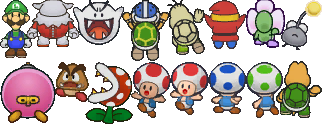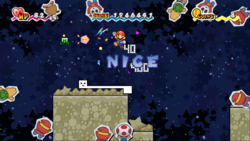Audience: Difference between revisions
Jude da Dude (talk | contribs) |
No edit summary |
||
| Line 55: | Line 55: | ||
|align=center|[[File:PMTTYD Crazee Dayzee Audience Sprite.png]]<br>[[Crazee Dayzee]]s | |align=center|[[File:PMTTYD Crazee Dayzee Audience Sprite.png]]<br>[[Crazee Dayzee]]s | ||
|1||4 | |1||4 | ||
|Randomly sings, causing most of the audience to fall asleep for 3 turns, preventing them from providing Star Power. | |Randomly sings, causing most of the audience to fall asleep for 3 turns, preventing them from providing Star Power and unable to participate in the [[Clock Out]] move. | ||
|align=center|- | |align=center|- | ||
|- | |- | ||
Revision as of 14:21, September 7, 2024

- “If you can get the audience excited, you'll build up more Star Power.”
- —Professor Frankly, Paper Mario: The Thousand-Year Door
The audience (or crowd) is a group of minor characters that appear in every battle sequence in Paper Mario: The Thousand-Year Door and Paper Mario: The Origami King, as well as in Super Paper Mario when the player performs a Stylish move.
History
Paper Mario: The Thousand-Year Door
- Main article: Stage (Paper Mario: The Thousand-Year Door)
In Paper Mario: The Thousand-Year Door and its remake, every battle is performed on a stage in front of the audience. They can either be allies or enemies during the battles. The audience appears in the bottom of the screen, giving Mario SP when he attacks enemies, except when they are made up of Dull Bones. SP is used to refill Mario's Star Power which he needs to use Crystal Star moves.
However, audience members are not only useful for restoring Star Power. Some interact with the combatants or other members. Additionally, the bosses Hooktail, Cortez, and the Shadow Queen can use the members as a power source, restoring HP upon eating or absorbing the members. Magnus von Grapple 2.0 uses audience members offensively, sucking up and launching them at Mario and his partners.
The audience may also throw objects at Mario, which can be helpful or harmful. The items that aid Mario can range from one coin to items such as the Boo's Sheet. Even powerful items such as Jammin' Jellies can be received, albeit rarely. In any case, if an item is thrown onstage and his inventory is full, the item simply falls on the stage and disappear. The items that hurt him range from rocks to crushed soda cans, never doing more than a few points of damage. In either case, a warning flashes before an audience member is about to throw something at Mario. The player has a few seconds to press ![]() to attack the offending member and have them temporarily flee the theater. Alternatively, the player can choose to do nothing to receive the item. The warning does not differentiate between good and bad items, so it is possible to attack an audience member offering a helpful item. When this happens, not only does this member flee, but several others do as well, but it is temporary. The player can also attack the audience member while the object has already been thrown. If the item is harmful, Mario can also switch places with his partner just before the item hits him, successfully dodging the item.
to attack the offending member and have them temporarily flee the theater. Alternatively, the player can choose to do nothing to receive the item. The warning does not differentiate between good and bad items, so it is possible to attack an audience member offering a helpful item. When this happens, not only does this member flee, but several others do as well, but it is temporary. The player can also attack the audience member while the object has already been thrown. If the item is harmful, Mario can also switch places with his partner just before the item hits him, successfully dodging the item.
Getting a Shine Sprite "Bingo!" causes every seat in the audience to fill. Any other "Bingo!," with the exception of the Poison Mushroom, fills half the capacity of the crowd. If three Poison Mushrooms are matched, however, every audience member runs away and Mario and his current partners' HP, FP, and SP are cut in half (by a third in the remake). Players can always attract audience members again by doing well in the battle, and the next battle always has a new crowd with other characters and usually the same species of characters. Leveling up also fills every seat, except if the player levels up after defeating Hooktail, in which the audience remains completely empty.
The maximum capacity of the audience depends on Mario's level. The bigger the crowd, the more Star Power he and his party can restore each turn. Mario rises one rank every ten levels, beginning the game with the Rising Star level.
- Rising Star: 50
- B-List Star: 100
- A-List Star: 150
- Superstar: 200
During certain boss fights, the audience will have the same members every time.
- Red Bones: All Dull Bones.
- Hooktail: Eight Toads on the right side.
- Magnus von Grapple: Half Punies (left side) and half X-Nauts (right side).
- Atomic Boo: All Boos.
- Sir Grodus: All X-Nauts.
- Prince Mush (remake only): All Toads.
Super Paper Mario
In Super Paper Mario, an audience of sorts appears whenever Mario or another playable character attacks an enemy and does a stylish move, which is done by shaking the Wii Remote when stomping on an enemy. They appear along the edges of the screen as paper cutouts. This approval of the audience gives the player a higher score than if they have just jumped on an enemy. The crowd in this game only has a handful of species from the previous game, taking out most of the species.
Paper Mario: The Origami King
In Paper Mario: The Origami King, the audience plays a more active role. As Mario rescues Toads folded up throughout the world, more of them fill the stands in each battle. Mario can pay the audience up to 999 coins a turn for assistance. In regular battles, they can automatically solve puzzles, damage enemies, and provide items and healing. For boss battles, they can scatter items across the ring grid, show the path that Mario takes in the ring's current configuration, and provide items and healing. The more audience members that Mario has recruited and the more he pays them, the greater these effects are. The Toads also make comments on the enemies Mario is currently facing or on the attack Mario is currently using.
Characters in the audience
Paper Mario: The Thousand-Year Door
In this game, characters do not appear in the audience until the Chapter they are introduced in. For example, Punies do not appear until Chapter 2, Bulky Bob-ombs do not appear until Chapter 5 (with the exception of the Macho Grubba and second Doopliss fight in the GameCube version), and so on. The only exception is inside the Pit of 100 Trials, where all possible types of members can appear in the lower floors. Upon returning to previous areas, the battles there can still only have the types of audience members they originally had - for example, the lone Spiky Goomba in Rogueport Underground can only ever have Toads, Goombas, Shy Guys, and/or Luigi in its battles' audiences.
In the Switch remake, to compensate for the drastic weakening of Star Power multipliers elsewhere, all audience members have a higher base value for provided Star Power.[1]
| Character | Base SP (GCN) | Base SP (Switch) | Description | Possible thrown objects |
|---|---|---|---|---|
Boos |
1 | 5 | Randomly turns a character in the battle Invisible for 1 turn. | Repel Cape Boo's Sheet Spite Pouch Rocks Cans |
Bulky Bob-ombs |
1 | 2 | Takes up two seats, reducing total audience capacity. Randomly ignites their fuse, exploding 5 turns later and causing many audience members to run away. |
- |
Crazee Dayzees |
1 | 4 | Randomly sings, causing most of the audience to fall asleep for 3 turns, preventing them from providing Star Power and unable to participate in the Clock Out move. | - |
Dull Bones |
0 | 2 | No unique behavior. | Bones Rocks Cans |
Goombas |
1 | 2 | No unique behavior. | Rocks Cans |
Hammer Bros. |
1 | 4 | Throws a hammer at Mario if he fails a hammer attack. | Hammers |
Koopa Troopas |
1 | 5 | Randomly hides in their shell for 5 turns. During this time, it won't provide Star Power until it comes back out. | Coins Hearts Flowers Courage Shell POW Block Rocks Cans |
Luigi |
1 | 4 | There can only be one Luigi. Will not be ejected from the audience if he is attacked by mistake. (GCN version only) |
Coins Hearts Flowers Mushrooms Super Mushrooms Ultra Mushrooms Honey Syrup Maple Syrup Jammin' Jelly Shooting Star Rocks |
Piranha Plants |
1 | 2 | Randomly eats an adjacent audience member after the enemy turn. | - |
Punies |
1 | 5 | May swarm the audience if Mario uses a Stylish move. Flees upon hearing certain loud noises. | Coins Hearts Flowers Dried Mushrooms Honey Syrup Maple Syrup Jammin' Jelly Tasty Tonic Slow Mushrooms Gradual Syrup |
Shy Guys |
1 | 4 | Randomly jumps on the stage, triggering a stage hazard. | Ice Storm Earth Quake Volt Mushroom Sleepy Sheep Dizzy Dial Ruin Powder Power Punch Stopwatch Mini Mr. Mini Mr. Softener Point Swap Fright Mask Mystery HP Drain Rocks Cans |
Toads |
3 | 7 | No unique behavior. Provides more Star Power than any other character of the audience. |
Coins Hearts Flowers Mushrooms Super Mushrooms Ultra Mushrooms Life Mushrooms Honey Syrup Fire Flowers Thunder Rage Shooting Star |
X-Nauts |
1 | 2 | May throw a rock at Mario if the battle drags on for too long. May throw a rock if Mario lands an attack that does nothing or receives contact damage. All other X-Nauts in the crowd will feign also throwing a rock. |
Rocks Cans |
Super Paper Mario
Paper Mario: The Origami King
- Toads
- Shy Guys (during Shy Guys Finish Last)
Names in other languages
| Language | Name | Meaning | Notes |
|---|---|---|---|
| Japanese | Kankyaku |
Audience | |
| Chinese (simplified) | 观众[?] Guānzhòng |
Audience | |
| Chinese (traditional) | 觀眾[?] Guānzhòng |
Audience | |
| Dutch | Publiek[?] | Audience | |
| French | Public[?] | Audience | |
| German | Publikum[?] | Audience | |
| Italian | Pubblico[?] | Audience | |
| Korean | 관객[?] Gwan'gaek |
Audience | |
| Spanish | Público[?] | Audience |
